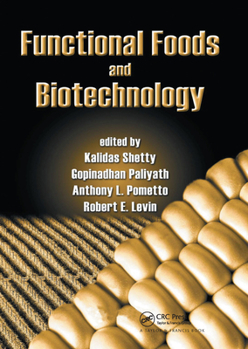Functional Foods and Biotechnology
Select Format
Select Condition 
Book Overview
World-wide there are more overweight and obese people (1 billion) than there are malnourished (0.8 billion). Today the challenge lies not just in meeting basic nutritional needs, but providing additional protective ingredients to help prevent the major chronic diseases associated with obesity. Biotechnology has become an important tool in recent years and scientists are now investigating advanced and novel strategies for the improvement of the functional aspects of food and food ingredients in an effort to manage the current and emerging health care challenges.
Functional Foods and Biotechnology focuses the information from the recently published Food Biotechnology to illuminate the role of biochemical processing in the improvement of functional foods with targeted health benefits and increased nutrient value. Applying molecular, biochemical, cellular, and bioprocessing concepts, the text explores the design of functional food ingredients; the bio-mobilization of major nutrients such as starch, lipids, vitamins, and minerals; and the use of specific phenolic metabolites from common botanical species that have been found effective in disease prevention. Many chapters are concerned with the role of ingredients in oxidation-linked disease, which is the core basis for the major chronic diseases. Specialty topics include non-nutritive sweeteners, immune factors from eggs, phytochemicals as antimicrobials, and passive immune improvement with pro- and pre-biotics. The text provides conceptual insights to key emerging techniques for improving food production and processing, enhancing food safety and quality, and increasing nutritional values and functional aspects of food for better human health. Introducing key concepts in biotechnology and the improvement of functional foods and nutrient sources, Functional Foods and Biotechnology addresses specific strategies and potential solutions to poor nutrition, be it caloric excess or deficiency, and the related health challenges facing the world today.Format:Paperback
Language:English
ISBN:0367390299
ISBN13:9780367390297
Release Date:October 2019
Publisher:CRC Press
Length:670 Pages
Weight:2.40 lbs.
Dimensions:1.5" x 6.9" x 9.5"
Customer Reviews
0 rating





